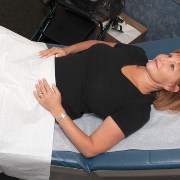 Photo: Getty Images
Photo: Getty Images
The Papanicolaou test (also known as the Pap test, Pap smear, cervical smear, or smear test) is part of a woman’s regular health check-up.
A Pap test checks for abnormal cell changes of the cervix. A Pap test can identify unhealthy cervical cells, cervical cancer and infection.
In 2010, the American Congress of Obstetricians and Gynecologists (ACOG) changed their recommendations for Pap tests.
ACOG’s main guideline change is the recommendation of the first Pap smear to be performed on healthy women starting at age 21. ACOG’s former recommendation was obtaining the first Pap test at either three years after a woman became sexually active or age 21 (which ever occurred first).
Here are additional ACOG guidelines for Pap tests:
• 21-30 years old. The recommendation is to have a Pap test every 2 years.
• 30 years and older. After three normal Pap tests for three years in a row, the recommendation is to have a Pap test every 3 years.
• Menopausal women still need Pap tests.
• If you have had a hysterectomy, you do not need a Pap test (unless you had precancerous cells).
• 65-70 years old. If you had three normal Pap tests with no abnormal results in the last 10 years, your doctor may halt Pap tests.
Also, the Centers for Disease Control and Prevention (CDC) stated all HIV-positive women should receive an initial Pap test and re-test six months later. If both Pap tests are normal, these women can receive yearly Pap tests.
You should not take a Pap test if you have your period. The best time to take a Pap test is 10-20 days after your last menstrual cycle. To avoid abnormal results, doctors recommend you avoid the following two days before a Pap test:
• Sex
• Vaginal sprays or powders
• Vaginal medicines (creams, suppositories, etc.)
• Tampons
• Douching
Please note Pap tests are not always 100 percent accurate. If you are told your Pap test results are false positive, there is no problem.
If a Pap test shows abnormal results (false negative), doctors usually do a small biopsy of the cervix. Also, doctors will monitor you more closely if you have abnormal cells.
If you are underinsured or not insured and unable to pay for a Pap test, there are several organizations which offer a free or low-cost Pap test. Planned Parenthood and the National Breast and Cervical Cancer Early Detection Program (NBCCEDP) both offer Pap test programs for women. Visit the Planned Parenthood website at http://www.ppfa.org or call 1-800-230-7526 to find a local office. You can also visit the NBCCEDP web site at http://www.cdc.gov/cancer/nbccedp/ or call 1-800-232-4636
For more information on Pap tests, call womenshealth.gov at 800-994-9662 or contact the following organizations:
Cancer Information Service, NCI, NIH, HHS
800-422-6237
http://cis.nci.nih.gov/
American College of Obstetricians and Gynecologists (ACOG) Resource Center
800-762-2264
http://www.acog.org/
American Cancer Society
800-227-2345
http://www.cancer.org
National Cervical Cancer Coalition (NCCC)
800-685-5531
http://www.nccc-online.org/
Planned Parenthood Federation of America
800-230-7526
http://www.ppfa.org
National Breast and Cervical Cancer Early Detection Program, CDC
800-232-4636
http://www.cdc.gov/cancer/nbccedp/
Sources:
http://www.womenshealth.gov/faq/pap-test.cfm
http://www.cancer.gov/cancertopics/factsheet/detection/Pap-test



Add a Comment1 Comments
The post is written in very a good manner and it entails many useful information for me. I am happy to find your distinguished way of writing the post. Now you make it easy for me to understand and implement the concept. Thank you for the post.
June 17, 2011 - 11:29pmGeneric Viagra
This Comment